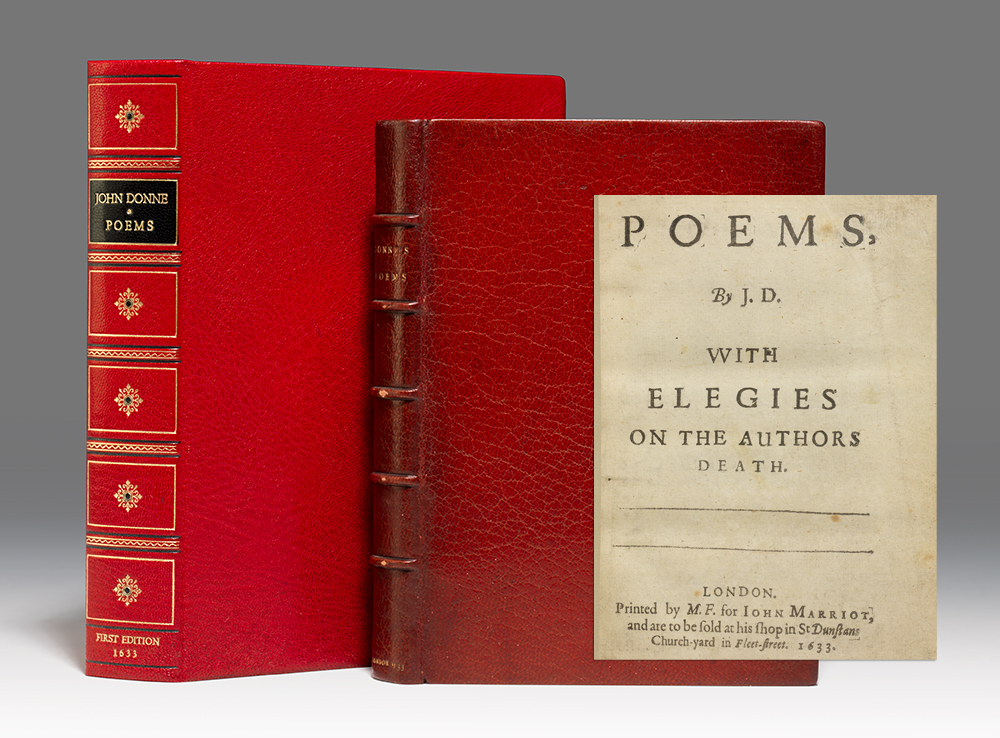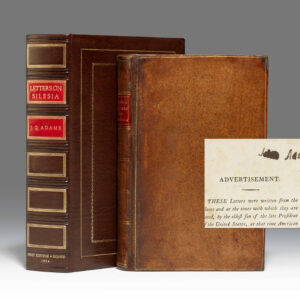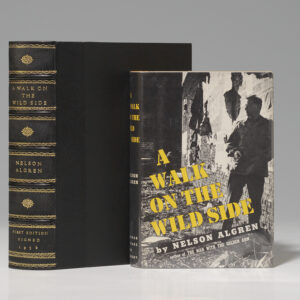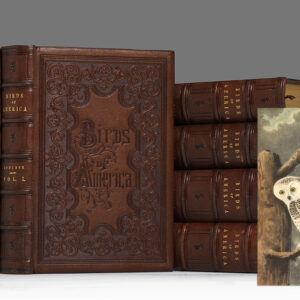Description
“FOR GODSAKE HOLD YOUR TONGUE, AND LET ME LOVE”: EXCEPTIONAL 1633 FIRST EDITION OF JOHN DONNE’S POEMS, THE GREENHILL COPY
DONNE, John. Poems, By J.D. With Elegies on the Authors Death. London: M.F. [Miles Fletcher] for John Marriot, 1633. Small quarto, early 20th-century full crushed red morocco, raised bands, all edges gilt. Collation: [A2] A-A2 B-Z4 Aa-Zz4 Aaa-Eee4 Fff3 [Fff4].
First edition of the collected poems of the greatest of the metaphysical poets, from the estate of renowned bibliophile and collector Harold Greenhill, handsomely bound at the French Bindery. An exceptional, wide-margined copy, with the “Printer to the Understanders” and “Hexastichon Bibliopolae” leaves, often lacking.
Although his poetry was circulated in small bundles of manuscript copies among the cultured circles of Elizabethan and Jacobean society, Donne deliberately kept most of it out of print, fearing to tarnish his reputation in the religious establishment. Thus almost none of his poetry appeared in print during his lifetime. “The first editors of Donne’s poetry divided his work into about a dozen groupings. The Songs and Sonnets which open the volume are generally amorous in theme; the Divine Poems, which close it, are described in their title… Early scholars took for granted that all the bawdy, cynical and lecherous poems were written by young Jack Donne, while all the somber, penitent, devotional poems were written by the godly divine. The more we learn about the matter, the less this easy division seems to stand up… The poetry of Donne represents a sharp break with that written by his predecessors and most of his contemporaries. Whether he writes of love or devotion, Donne’s particular blend of wit and seriousness, of intense feeling, darting thought, and vast erudition, creates a fascination quite beyond the reach of easier styles and less strenuous minds” (Adams).
“With Donne begins a new era in the history of the English love lyric… The spirit of his best love poetry passed into the most interesting of his elegies and his religious verses, the influence of which was… perhaps even greater, than that of his songs” (Rosenbach 30:127). This edition is “the first collected edition of Donne’s poems, derived according to current scholarly thinking from manuscript sources in direct descent from the author’s papers. It has been the basis of all scholarly editions since then, including the Grolier Club edition of 1895” (Pirie 81). This copy with page 273 (Nn1) in the uncorrected state (without running title and with 35 lines of text), and with mispaginations as in Pforzheimer. Bound with “Printer to the Understanders” and “Hexastichon Bibliopolae,” both often lacking; bound without Epistle (A3) (as often), blank [A, A4]. Several lines in the Satyres on pages 330, 331 and 341, originally containing lines offensive to the king and church, are left blank. Donne bibliographer Sir Geoffrey Keynes concludes that various corrections in the text do not differentiate earlier from later states, but were random in the preparation of the text. Keynes 78. STC 7045. Grolier 100 25. Pforzheimer 296. Hayward 54. Bookplate. Faint penciled notations to blank terminal leaf.
Text generally fresh, tiny repair to corner of title page and two leaves (L1, Rr4) without affecting text, expert archival repair to small closed tear (S1). An exceptional near-fine copy, handsomely bound and with fine provenance.



